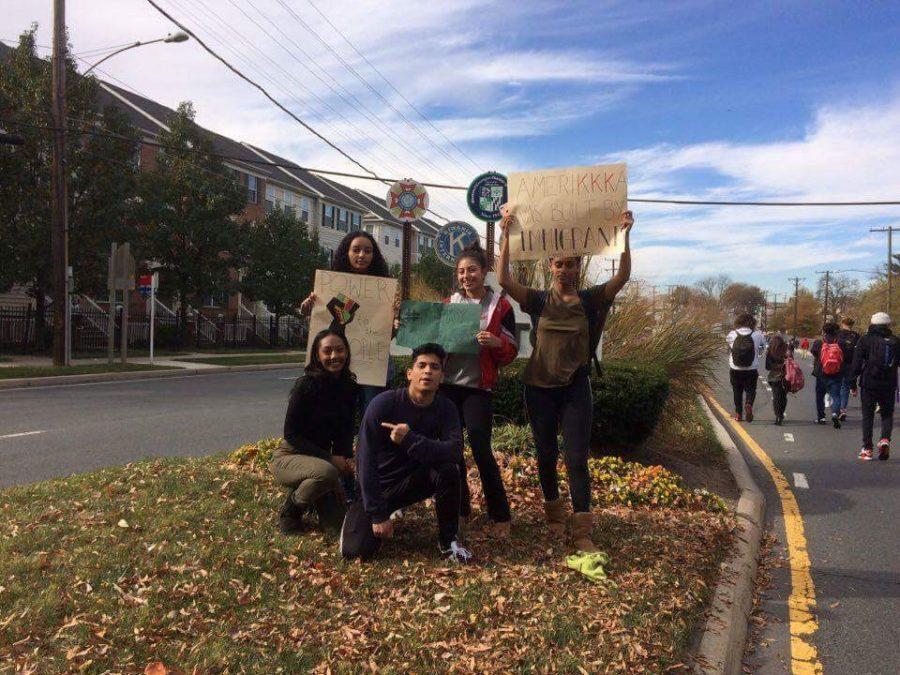Election Results Move Students to Vocalize Beliefs
Photo courtesy of Erin Namovicz
Students at Montgomery Blair High School during the walkout.
December 8, 2016
For the past year, America has been bombarded with name-calling, mudslinging, deleted emails, accusations of sexual assault, proposed blueprints for a wall between nations and other surprises. But in the biggest surprise of all, on Tues. Nov. 9, Donald Trump defeated Hillary Clinton in the race to become the 45th U.S. President, astonishing voters worldwide who believed that he never stood a chance.
While Donald Trump was popular in many parts of the country, in major urban areas, such as the Washington D.C. metropolitan area, Hillary Clinton had a far larger following.
“I don’t think many people expected him to win, including himself, so when it happened, the entire world was in complete shock,” junior Omisa Jinsi said.
Republicans celebrated Trump’s win, while Democrats expressed their disbelief and, in some cases, protested. Students at Blair High School, Richard Montgomery High School and numerous others in Montgomery County staged a walk-out during classes against Trump’s campaign platforms, such as abortion, immigration, and foreign policy.
“We are accepting the results because we believe in the democratic process,” junior Sofia Muñez from Blair High School said. “What we were mostly protesting is the ideology that comes along with Trump being elected.”
Students across MCPS have taken it into their own hands to become united and fight against Trump’s ideals. Although some might say that it does not make a difference, the high school protests have certainly gotten attention of the press and local authorities.
In response to a student being harmed and hospitalized after the walk-out at Richard Montgomery High School, Superintendent Jack Smith distributed a video to all MCPS schools that actively barred political protests and walkouts in the upcoming weeks and months.
According to Smith’s video, “while MCPS supports everyone’s right to assemble and respectfully express themselves, these demonstrations have unfortunately generated valid concerns regarding the security of our students outside of our schools.”
Smith spoke of respect and tolerance to one another, yet many MCPS students feel they cannot reciprocate these feelings for President-elect Trump. Minorities, women, immigrants and others feel personally harmed by the President-elect’s policies and wanted to make a public statement.
“We reject that [hateful] aspect of his campaign and presidency and we want to be unified to fight those ideas,” Muñez said.
Maryland has just become a majority-minority state, meaning that there are more Hispanics, Asians, African Americans, and other minorities than Caucasians in the state. Therefore, the election of a candidate with strong stances against immigration and who has exhibited racism, has hit the CHS and and other MCPS communities particularly hard.
According to junior class president Hana Mangat, she knows many people in Potomac who voted for Trump for economic reasons. Yet, she also knows many high schoolers who are avidly against him for social reasons, such as his discrimination and racism that has resulted in many hate crimes since his election.
Many CHS students were actively involved in the election cycle, supporting their preferred candidate in discussions, campaigns, and demonstrations.
According to a survey of 78 CHS students, 67.11 percent supported Hillary Clinton, 19.74 percent supported Donald Trump and 13.16 percent affiliated with other candidates, such as Libertarian Party candidate Gary Johnson.
Based on the Observer poll, the CHS student body is overwhelmingly liberal, and does not reflect the views of America as a whole. Rather, the views of CHS students reflect those of the residents of Montgomery County.
“The CHS community is in somewhat of a [Potomac] bubble, not understanding the majority of middle class Americans,” senior Maxim Goohs said.
Trump’s victory has led to the start of important conversations about race and hatred within societies, but has also created high tensions and feelings of vulnerability.
“This is really a hot button topic and very polarizing,” science teacher Sara Nemati said. “It is also upsetting for some students and teachers.”
While MCPS discourages teachers from espousing their political views in the classroom, many argue that it is important to let students know that they, themselves, should be talking about this.
According to social studies teachers Kevin Doherty and Paul Jacobson, they allowed student discussion the day after the election because many were still in shock, and it had historical relevance to their classes.
Students appreciate the ability to express their concerns, fears and hopes for the upcoming four years on school grounds. Yet, discussion alone cannot necessarily overcome the economic, racial and gender divisions that Trump has fostered.
“I do worry that that we are living in two Americas, that we do not understand each other,” Jacobson said. “[There are not as] many Republicans [at CHS], so I have not seen issues.”
At CHS and other MCPS schools, many students recognize that they cannot change the results of the election, and hope that the country can begin to heal.
“The election has made the community closer,” Jinsi said. “Sure, we are all still in shock of what happened but, given how liberal the community is, people are likely to be extra supportive of each other rather than resentful or bitter.”
Regardless of political affiliation and voting eligibility, this election cycle has taught the CHS community a valuable lesson; it has engaged citizens and highlighted the importance of political involvement and peacefully advocating for our democratic ideals.
“If anything, this election shows that history is still being made and that being politically engaged is more important than ever,” Doherty said.


